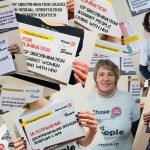TERMS OF REFERENCE For Development of CHASE THE VIRUS, NOT PEOPLE! National Campaigns
Eurasian Harm Reduction Association (EHRA) is looking for national partners (country consortia, NGOs, community organizations and initiative groups) to develop and implement the CHASE THE VIRUS, NOT PEOPLE! campaign at the national level in 3 countries of the Eastern Europe and Central Asia region.
The assignment is implemented in the framework of the Eurasian Regional Consortium project “Thinking outside the box: overcoming challenges in community advocacy for sustainable and high-quality HIV services”, funded by the Robert Carr civil society Networks’ Fund.
The Eurasian Regional Consortium was formed in 2015 in response to the distinct need for stronger collaboration among key population networks in Eastern Europe and Central Asia (EECA) to address a shared threat to sustainability of HIV programs for people who use drugs, men who have sex with men, trans people, and people living with HIV. Eurasian Harm Reduction Association (EHRA), the lead partner of the Consortium, together with Eurasian Coalition on Male Health (ECOM) and Eurasian Women’s Network on AIDS joined forces to respond funding insecurity for HIV services for key population in countries of EECA.
The Consortium’s joint efforts focus on addressing the needs of people who use drugs, men who have sex with men, transgender people and women living with HIV in a capacity building and coordinated advocacy on HIV resource mobilization, budget advocacy, fiscal accountability. Our task is to build community-led initiatives and political support for strategic, sufficient and sustainable investments in services along the continuum of HIV care for key populations.
CHASE THE VIRUS, NOT PEOPLE!
Description of the campaign can be found at http://chasevirus.org.
Campaign was launched at AIDS2018 in Amsterdam, the Netherlands, in July 2018. The regional communities’ networks, who joined forces in the campaign represent key populations affected by HIV: people living with HIV, women living with HIV, youth and teenagers, affected by HIV, people who use drugs, sex workers, men who have sex with men, trans people. The campaign emphasized the common needs of all key population groups and focuses on overcoming the discrimination, stigmatization and criminalization of key populations as a key condition for an effective response to the HIV epidemic in EECA countries.
Campaign continued to grow both on regional, national and community levels. Waves of the campaign included: Zero Discrimination Day on March 1, 2019; HIV is not a crime! Campaign, organized by Eurasian Women’s Network on AIDS; Chase Stigma, not People! Campaign, organized by Eurasian Coalition on Male Health; national campaigns in Belarus (position statement of “People Plus”) and Moldova, and many other acions of organizations and individuals across the region. In 2019-2020 the campaign enters the new stage of its further development and has to continue to be loud not only on the regional and international arena, but also on the country level, in cities and towns, promoted by NGOs, community groups and activists for the sake of the rights of all and everyone affected by HIV.
For the country community leaders joining the regional campaign will bring additional regional attention to the national advocacy challenges and could lead to more effective advocacy to remove legal barriers to effective HIV response among key affected populations.
Aim of the campaign:
To strengthen the voice and influence of national activists at the national level in articulating their advocacy priorities and drawing the attention of target audiences to the problems of key populations in relation to the catastrophic HIV/AIDS epidemic in the EECA region, in particular the impact of stigma, discrimination and criminalization on effective response measures to HIV/AIDS epidemic and mortality reduction.
Objectives of the campaign:
- Make the voice of national communities heard internationally through coverage of national campaigns in regional and global communication channels.
- Facilitate mobilization of allies at the national level in achieving advocacy priorities by providing resource support, experience and expertise of regional partners in the campaign “Chase the virus, not people!” at the global and regional levels.
- Improve the skills of national level activists in formulating and articulating clear and effective messages of campaign that will reach the target audience (general public / decision makers) using all available information, data and evidence regarding the impact of:
– repressive, discriminatory laws and practices, as well as stigma against key populations and people living with HIV,
– the consequences of exclusion of key populations and people living with HIV from decision-making processes,
– the negative effects of reduced international support.
Campaign target audience:
Depending on the objectives addressed and activities for their realization implemented, the campaign targets the following audiences: key populations communities, government officials and political leaders, UN agencies and international organizations, donors, practitioners, academia, expert community, business, general population.
The campaign has already accumulated:
- Recognizable campaign logo, slogan and promo video (available in Russian and English);
- Site with the ability to create a country/subcampaign section;
- Pages in social networks;
- Campaign video from AIDS2018;
- Experience of participation in the campaign activities during AIDS2018;
- Campaign coordinator and communication team, who can be contacted for advice and technical support.
THE TERMS OF REFERENCE ASSIGNMENT
TASK:
to develop and implement the national campaign under the slogan “Chase the virus, not people!” with specific advocacy objectives in the framework of the regional campaign.
EHRA is issuing 3 grants in 3 countries accordingly to the winners in the open competition (NGO, community organization or initiative groups).
AIM (sample, to be adjusted per country needs):
To strengthen partnerships between national key populations organizations and activists to draw attention of key steakholders and decision makers to the impact of stigma, discrimination and criminalization on effective response measures to HIV/AIDS epidemic and mortality reduction in the country
Grant sum – 2,000 Euro per country.
EHRA technical support – EHRA representative’s participation in development of the national campaign (country visit for 1-day mentorship session; on-line technical support to the national campaign organizer).
Terms of project realization – till the end of 2019.
REQUIREMENTS FOR APPLICANTS:
- Be registered in one of the countries of the Eastern Europe and Central Asia region;
- Work with/represent/provide services/advocate for the needs of key populations on the national level;
- Share the aim and objectives of the regional campaign “Chase the virus, not people!”;
- Describe the problem statement for advocacy within the national campaign;
- Identify the goal of the national campaign;
- Demostrate the previous experience in realization of advocacy/communication campaigns (if any).
To apply for the assignment the organization or individual has to submit to natalia@harmreductioneurasia.org till COB September 20, 2019 the following documents:
- Description of the organizational experience to follow the above described requirements,
- Letter of interest (not less than 500 words and not more than 1500 words),
- Timeline of campaign development and implementation with the brief description of stages and terms.
The submitted applications will be evaluated by the selection committee of the Eurasian Regional Consortium. The following criteria will be used to evaluate the bids (the maximum possible number of points is 100):
- Work experience with key populations (20);
- Problem statement (20);
- Clear and achievable goal of the campaign (30);
- Realistic and clear timeline of the campaign (30).
_______________________________________________________________________________________________
ANNEX
The following suggested algorithm of work can be realized by any country consortium, organization or initiative group to develop and implement the campaign in any EECA country:
Step 1 Problem statement
- The problem may be common to all communities or relevant only for one community.
- But the campaign will sound louder if it combines the efforts of all communities, regardless of whose problem is stated in the campaign’s appeal.
- IMPORTANT!!!! When stating a problem, always remember the campaign slogan – CHASE THE VIRUS, NOT PEOPLE! – and campaign themes – stigma, discrimination, criminalization. If the country’s campaign is aimed at a specific problem/community, it is possible to modify the slogan, but only one of the nouns, in order to preserve recognition.
Step 2 Aim/objectives identification
- Aim – what you want to get in the end – realistic, achievable.
- Objectives – what you will do to achieve the aim.
Step 3 Target audience identification
Target audiences can be one or several:
- Officials / civil servants as decision makers on a reported problem;
- The general population to raise awareness;
- Civil society, key populations;
- International organizations / donors;
- Business;
- Expert community.
Step 4 Resources needed
- Financial – existing/to be raised;
- Human;
- Non-financial contribution (in-kind).
Step 5 Terms of a campaign
- A campaign may be long-term, but it is impossible to maintain a high level of attention to it constantly without significant investment;
- A campaign may be associated with certain dates or events;
- The deadlines should be realistic and determined on the basis of available resources.
Step 6 Instruments (closely connected with target audience)
Example: target audience – general population:
- Work with media – publication of the consortium’s position on the stated problem, appeals, articles, journalistic investigations, using the media to post campaign videos and statements;
- Promotions / marches / concerts / mass events;
- Campaign site, sites of partner organizations, social media pages.
Step 7 Planning and responsibilities
- Define the coordinator;
- Under the guidance of the coordinator, make a plan for the organization and implementation of the campaign, designate persons responsible for each stage of organization and implementation;
- Look for technical assistance from the regional campaign team and cooridnator, if necessary.
Step 8 Implementation and monitoring
- Do not delay monitoring for later – immediately analyze what is happening and make adjustments to the campaign implementation;
- Summarize the results – Have you reached the aim? What are the landmarks on the way to achieving the aim? How many people have been attracted / have learned about the problem? How many partners have you got? Perhaps new resources were attracted?
- Bring the results of the campaign to the attention of the target audience.










